The opera 'Carmen' was based on Mérimée’s novella and was first performed in 1875. However, the author, Georges Bizet, who died the same year, never knew that his work would become such a classic, as it took several years for Carmen to be a hit. Its success has never waivered ever since and it has become one of the best-known and most popular operas of all time, with evergreens such as the habanera 'L’amour est un oiseau rebelle' and the 'Toreador’s Song'. The passionate and tragic love affair between Carmen and José has been kept by Bizet as the centre of the story. But the character of Escamillo, a famous torero infatuated with Carmen, is also given much prominence.
There have been many film versions of Carmen from about 1906 to the present day, based either on Mérimée’s novella or on Bizet’s opera, or a combination of both. Here is a selection of nine film Carmens.
Theda Bara
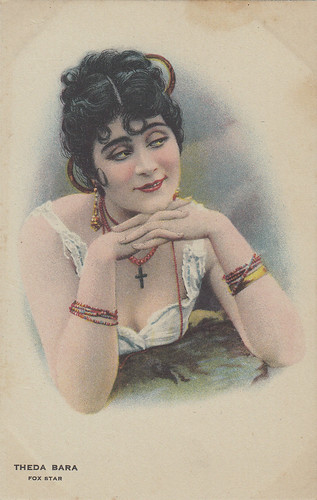
American postcard by Kline Poster Co. Inc., Philadelphia. Photo: Fox. Theda Bara in Carmen (Raoul Walsh, 1915).
Carmen (1915), directed by Raoul Walsh, was one of the prestige movies produced by Fox for their reigning vamp, Theda Bara. The company was said to have spent an estimated $30,000 recreating Sevilla in their Fort Lee studios. A concurrent version, starring opera diva Geraldine Farrar and directed by Cecil B. De Mille, was released simultaneously. Although the critics generally preferred De Mille’s movie, Theda Bara’s Carmen was a hit at the box office.
Pola Negri
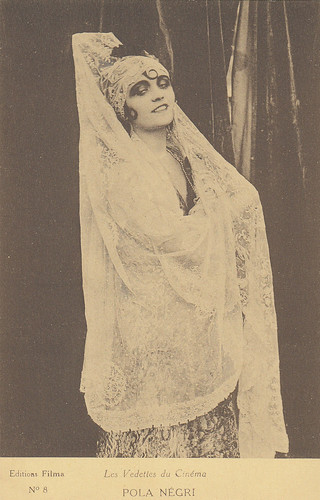
French postcard by Editions Filma in the Les Vedettes du Cinéma series, no. 8. Pola Negri in Carmen (Ernst Lubitsch, 1918).
Carmen (1918) was the second of the seven films Pola Negri made with Ernst Lubitsch. Their association was one of the most successful ones in silent movie history. Negri’s frequent co-star Harry Liedtke played Don José. In 1921, Carmen was released in the U.S.A. under the title Gypsy Blood. It was warmly welcomed by audiences and critics alike and was one of Negri’s German movies which paved her way to Hollywood stardom.
Raquel Meller

Italian postcard by G. Vettori Bologna, no. 3544. Raquel Meller and Raymond Guérin-Catelain in Carmen (Jacques Feyder, 1926).
French movie Carmen (1926) was conceived as a star vehicle for famous Spanish singer Raquel Meller. Reportedly, Meller and director Jacques Feyder didn’t get along well during filming. The actress wanted to make Carmen appear more as a victim than a femme fatale, while Feyder preferred her to play the character as Merimée had conceived it. Later Feyder declared that he had been asked "not to do a film of 'Carmen' with Raquel Meller but to do something with Raquel Meller on Carmen". Nevertheless, the film pleased the audiences and was praised for its authentic feel.
Dolores Del Rio
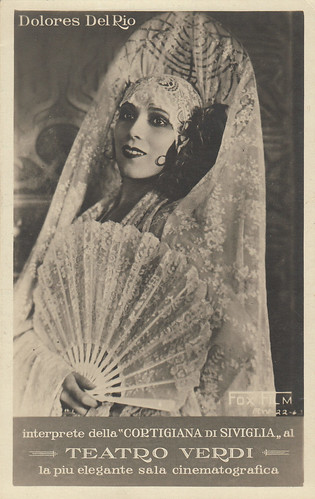
Italian postcard by G. Vettori Bologna. Photo: Fox-Film. Dolores Del Rio in The Loves of Carmen (Raoul Walsh, 1927).
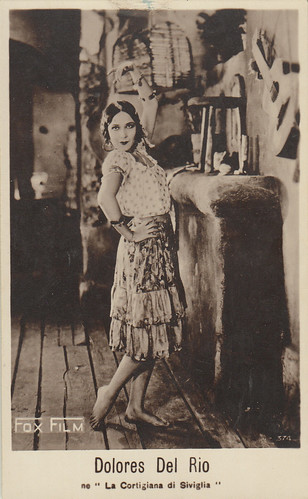
Italian postcard by G.B. Falci Editore, Milano, no. 374. Photo: Fox Film. Dolores Del Rio in The Loves of Carmen (Raoul Walsh, 1927).
Twelve years after having directed Theda Bara in Carmen, Raoul Walsh gave audiences another lavish version of Merimée’s novel with The Loves of Carmen (1927), starring Mexican-born Dolores Del Rio. Don Alvarado played Don José and Victor McLaglen was torero Escamillo. According to a review by famous critic Mordaunt Hall published in the New York Times in September 1927, "Miss Del Rio, with her bright eyes, pretty lips and lithe figure, gives a decidedly unrestrained portrait of the faithless creature and her characterization is apt to make the Carmens of the past appear relatively conservative".
Imperio Argentina

Latvian postcard by EMBR, no. 3131. Photo: Ufa. Imperio Argentina in Carmen (la de Triana)/Andalusisches Nächte (Florián Rey, 1938).
Carmen (la de Triana)/Andalusisches Nächte (1938) was a Spanish-German co-production filmed in two versions, both starring popular actress and singer Imperio Argentina. Important changes were made to the plot as Carmen is not killed at the end of the story and Don José dies a hero by saving his former comrades in arms, ambushed by smugglers. In the German-language version, Friedrich Benfer was substitued to Rafael Rivelles as Don José.
Viviane Romance
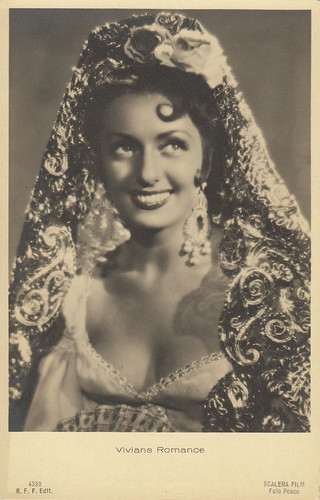
Italian postcard by Ballerini & Fratini, Firenze, no. 4392. Photo: Scalera Film / Pesce. Viviane Romance in Carmen (Christian-Jaque, 1944).
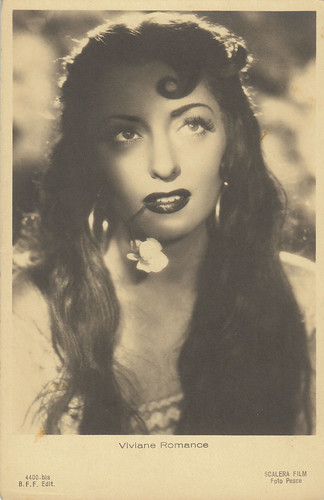
Italian postcard by Ballerini & Fratini, Firenze, no. 4400.bis. Photo: Scalera Film / Pesce. Viviane Romance in Carmen (Christian-Jaque, 1944).
Carmen (1944) was a French-Italian co-production and was filmed in the Scalera Studios in Rome. French star Viviane Romance’s sultry brunette looks and fiery temperament were well-suited for the Carmen character. Jean Marais, who had just shot to stardom with L’éternel retour one year before, played Don José.
Rita Hayworth
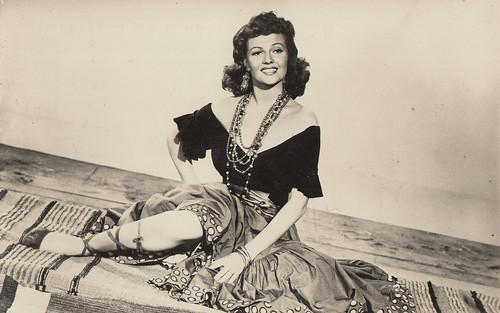
Spanish postcard, no. 2427. Rita Hayworth in The Loves of Carmen (Charles Vidor, 1948).
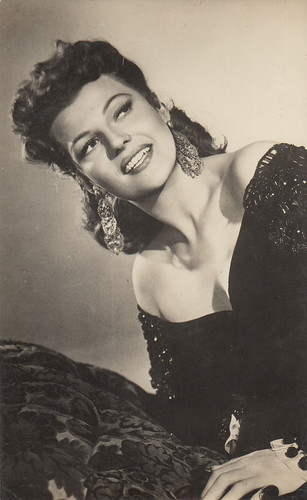
Spanish postcard, no. 2453. Rita Hayworth in The Loves of Carmen (Charles Vidor, 1948).
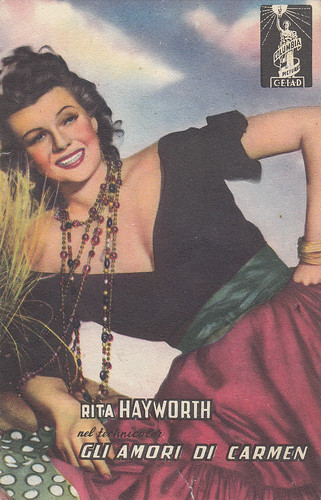
Italian promotional postcard. Rita Hayworth in The Loves of Carmen (Charles Vidor, 1948).
The Loves of Carmen (1948) was produced by Columbia to showcase their number one female star at the time, Rita Hayworth. Glenn Ford, her Gilda co-star, played Don José. As Hayworth was co-producer of the movie, she hired her father, Spanish-born Eduardo Cansino, to choreograph the dances. The Loves of Carmen was a crowd-pleaser. Rita Hayworth fans were thrilled to see their idol back to her usual self after having been transformed into an icy short-haired blonde by Orson Welles in The Lady from Shanghai one year before.
Dorothy Dandridge

Italian postcard by B.F.F. Edit., no. 3264. Photo: 20th Century Fox. Dorothy Dandridge in Carmen Jones (Otto Preminger, 1954).
Carmen Jones (1954) was based on the successful Oscar Hammerstein II’s Broadway musical which ran from the 2nd of December 1943 to the 10th of February 1945. It was adapted from Bizet’s opera but the action took place in the Afro-American community during World War II. Bizet’s music was used but with new lyrics. In the plot, Carmen became a parachute factory worker, Don José became Corporal Joe and torero Escamillo became Husky Miller, a boxing champion. At first, director and producer Otto Preminger didn’t want to cast Dorothy Dandridge as Carmen, as he thought she was too sophisticated for the role. It was only when the actress turned up at an appointment swinging her hips in a sexy outfit that he knew he had found his right Carmen. Dandridge and Preminger soon began a love affair that lasted a few years but which was over at the time he directed her again in Porgy and Bess (1959). As Preminger was convinced that only opera-trained voices could do justice to Bizet’s music, he hired Marilyn Horne and Le Vern Hutchinson to dub Dandridge and Harry Belafonte, who played Joe, for their songs. Carmen Jones made Dorothy Dandridge a star and earned her a Best Actress Oscar nomination, which was a first for an Afro-American woman.
Sara Montiel

Spanish postcard, no. 3136. Sara Montiel in Carmen la de Ronda/The Devil Made a Woman (Tulio Demicheli, 1959).
In Carmen la de Ronda (1959), Spanish superstar Sara Montiel played Carmen opposite French actor Maurice Ronet as Don José. The Carmen character was transformed from a tobacco factory worker to a café singer. This allowed Sara Montiel to perform several songs to please her eager fans.
Text and postcards: Marlene Pilaete.
No comments:
Post a Comment